Regional Varieties of the English Language English is
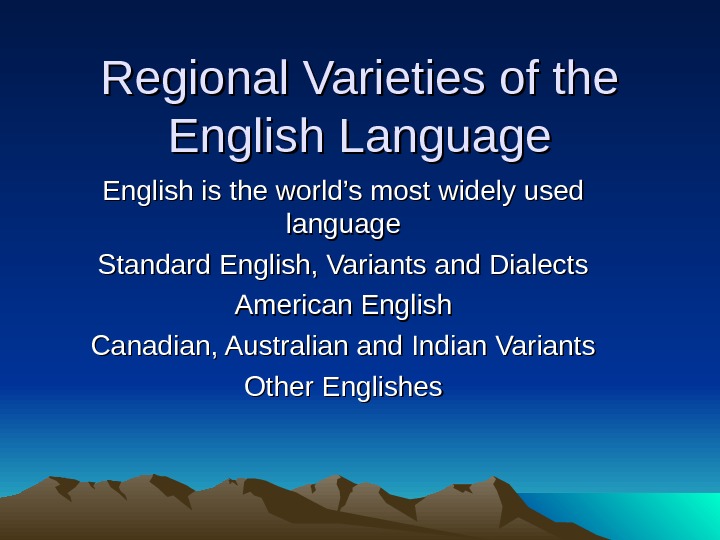
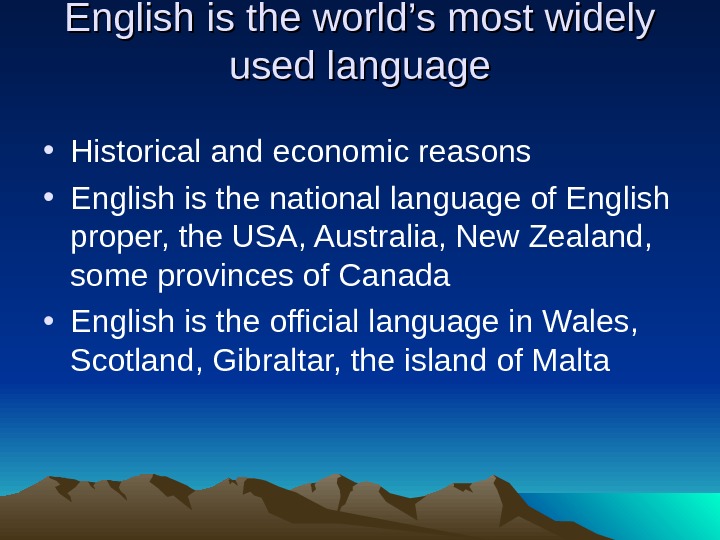
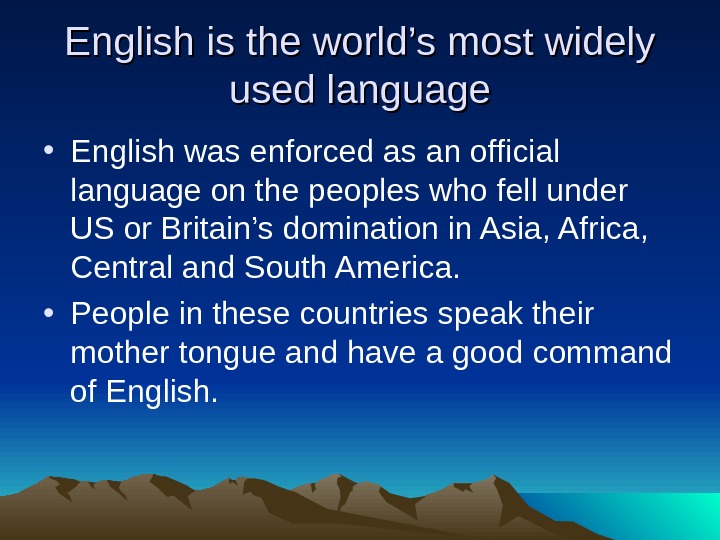

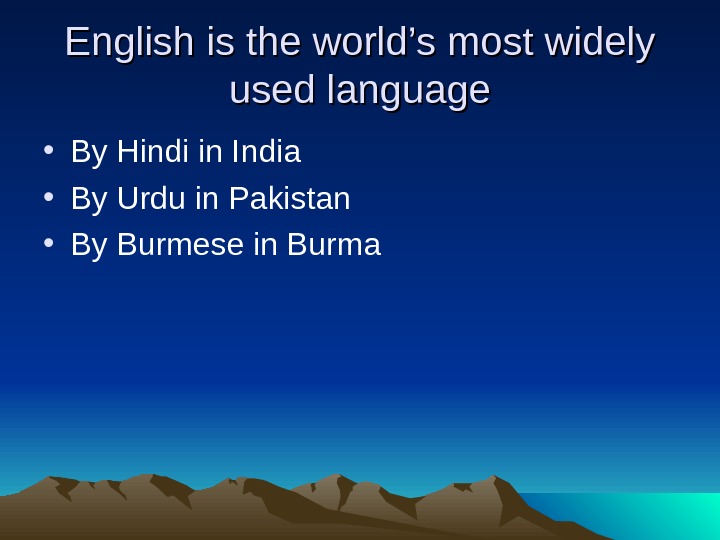
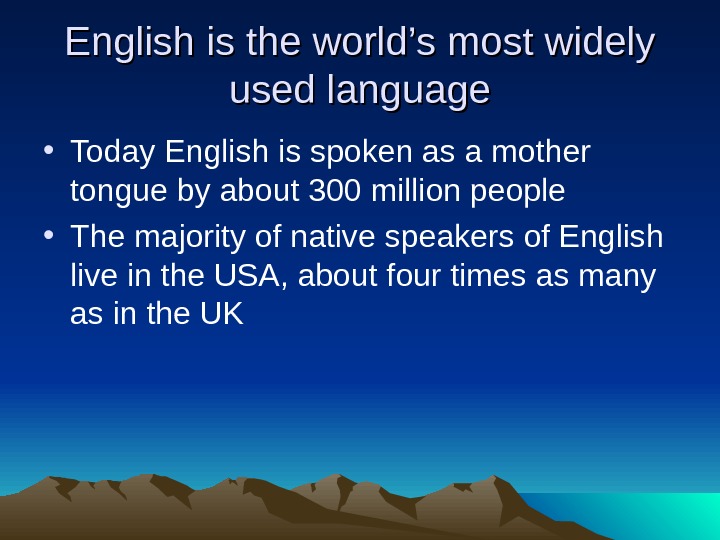
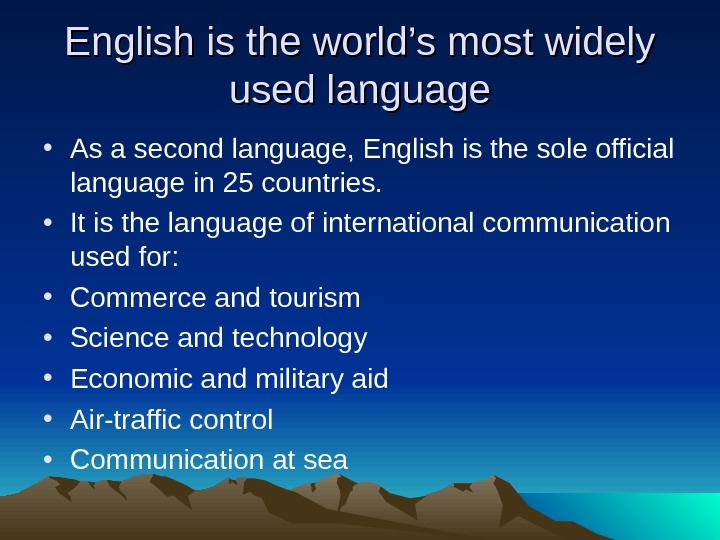
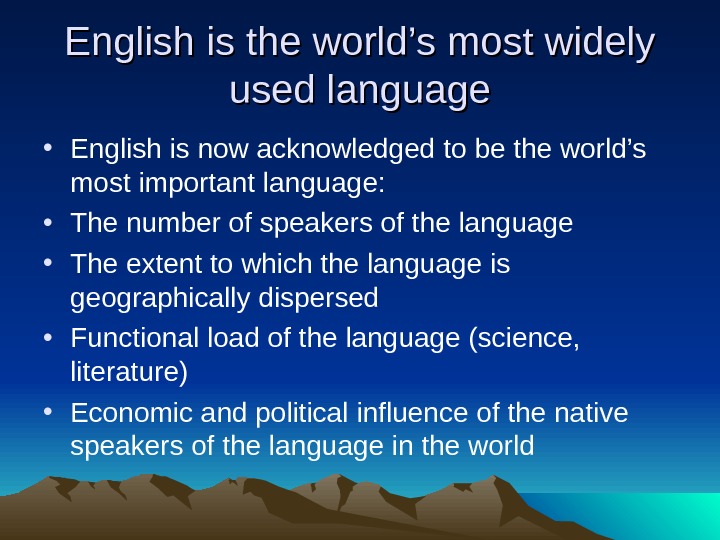
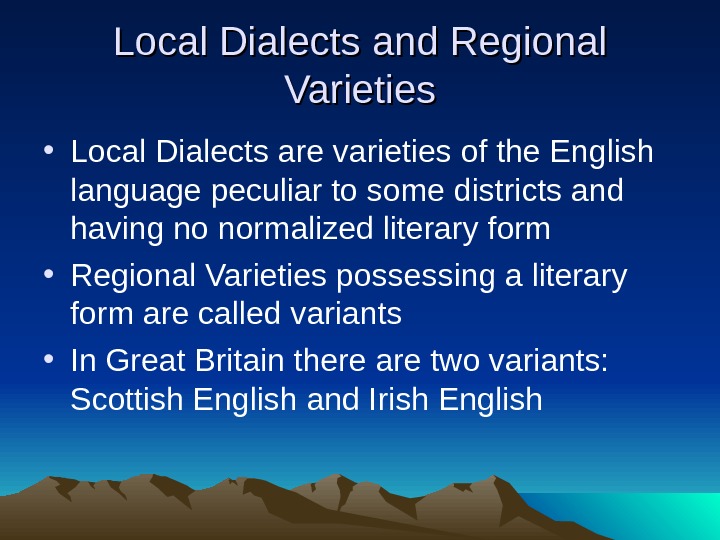
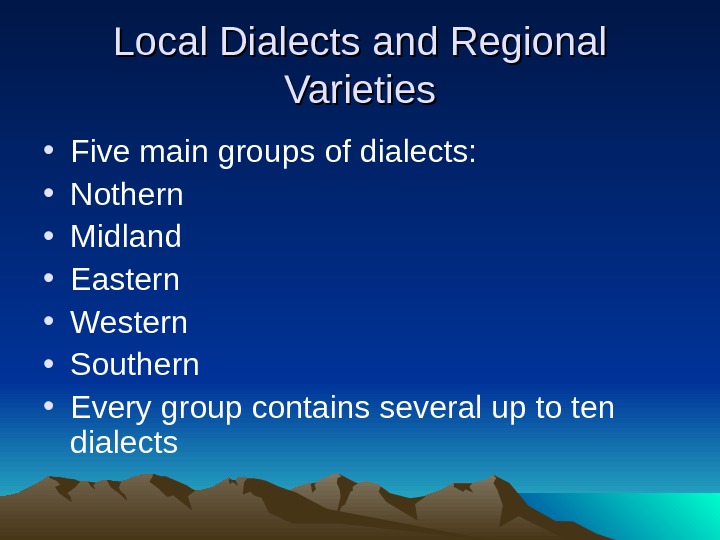

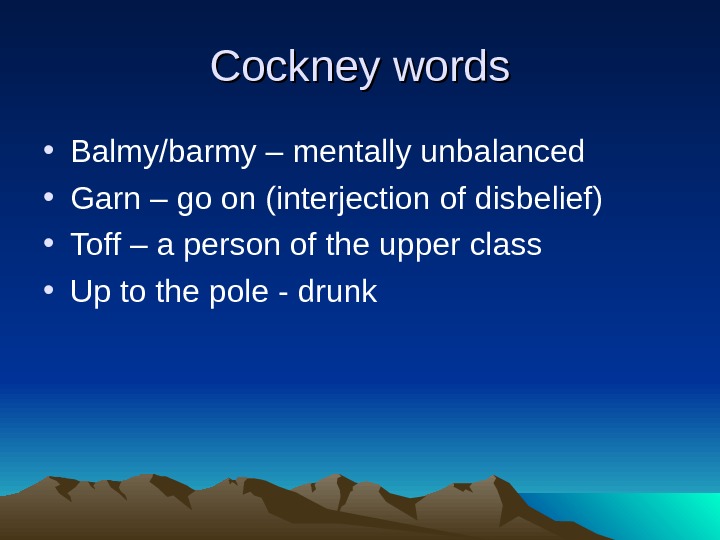
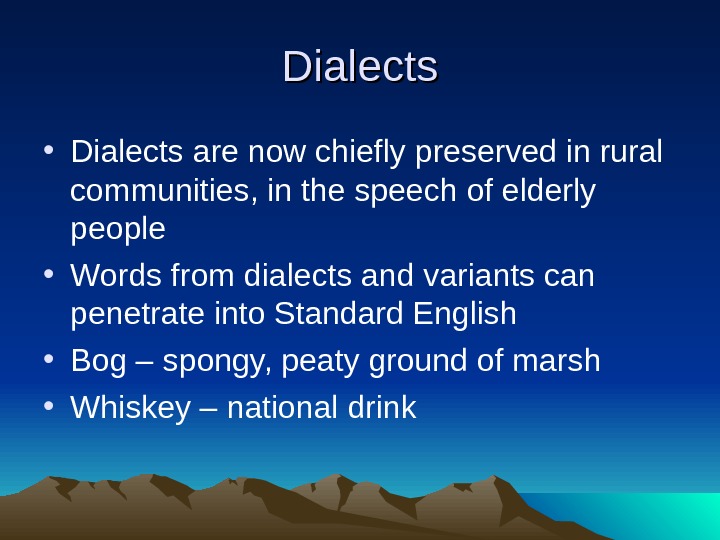
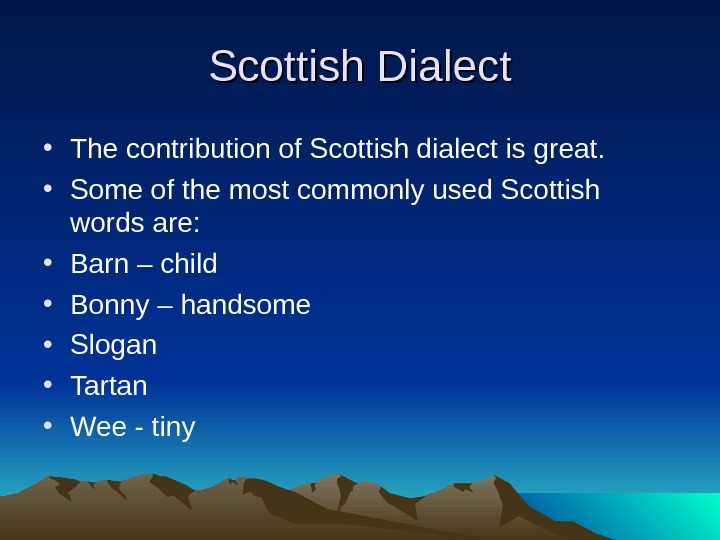
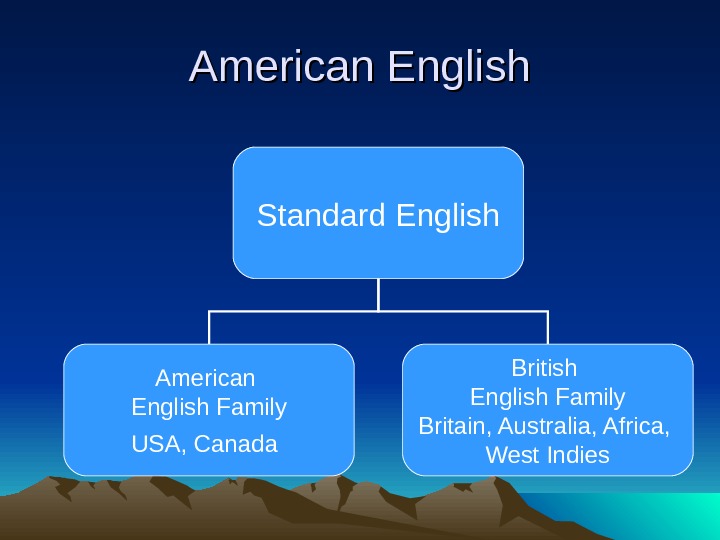
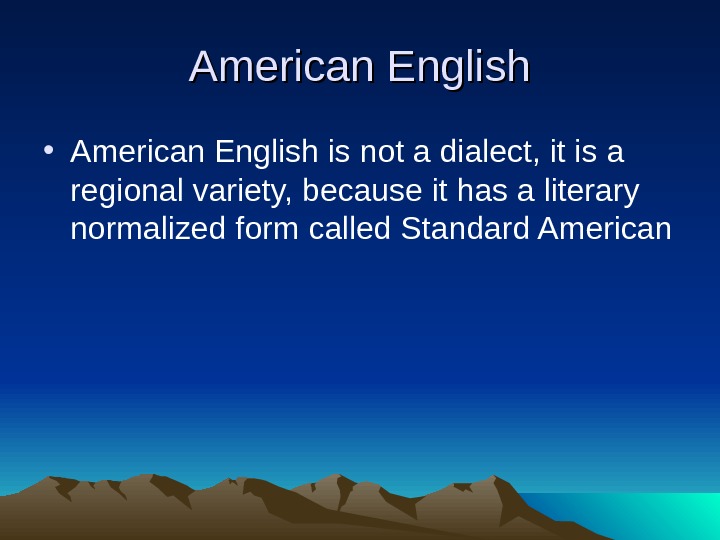
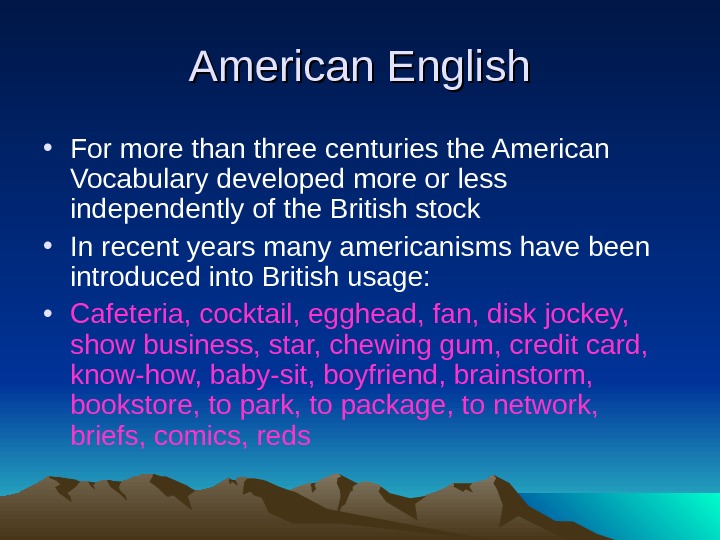
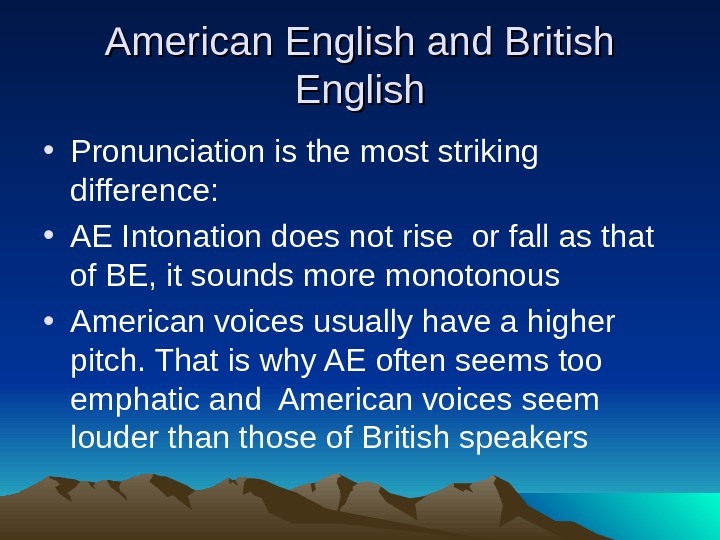
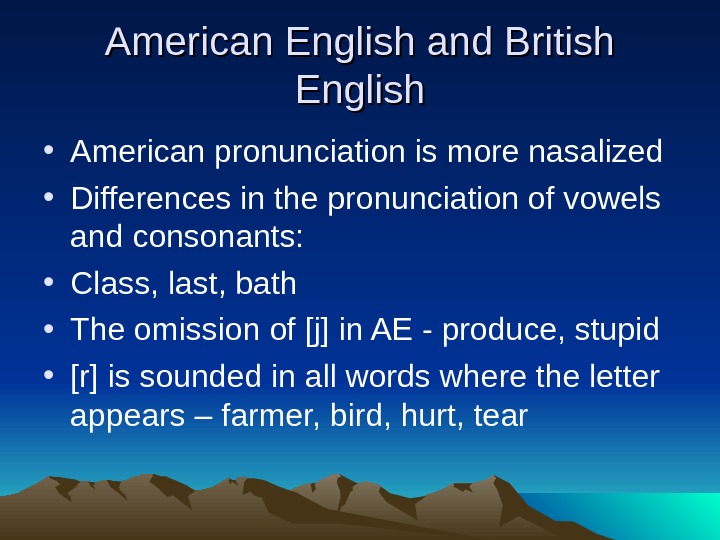
regional_varieties_of_the_english_language.ppt
- Размер: 70.5 Кб
- Количество слайдов: 19
Описание презентации Regional Varieties of the English Language English is по слайдам
 Regional Varieties of the English Language English is the world’s most widely used language Standard English, Variants and Dialects American English Canadian, Australian and Indian Variants Other Englishes
Regional Varieties of the English Language English is the world’s most widely used language Standard English, Variants and Dialects American English Canadian, Australian and Indian Variants Other Englishes
 English is the world’s most widely used language • Historical and economic reasons • English is the national language of English proper, the USA, Australia, New Zealand, some provinces of Canada • English is the official language in Wales, Scotland, Gibraltar, the island of Malta
English is the world’s most widely used language • Historical and economic reasons • English is the national language of English proper, the USA, Australia, New Zealand, some provinces of Canada • English is the official language in Wales, Scotland, Gibraltar, the island of Malta
 English is the world’s most widely used language • English was enforced as an official language on the peoples who fell under US or Britain’s domination in Asia, Africa, Central and South America. • People in these countries speak their mother tongue and have a good command of English.
English is the world’s most widely used language • English was enforced as an official language on the peoples who fell under US or Britain’s domination in Asia, Africa, Central and South America. • People in these countries speak their mother tongue and have a good command of English.
 English is the world’s most widely used language • After the Second World War as a result of the national literation movement throughout Asia and Africa many former colonies have gained independence and in some of them English as the state language has been replaced by the national language
English is the world’s most widely used language • After the Second World War as a result of the national literation movement throughout Asia and Africa many former colonies have gained independence and in some of them English as the state language has been replaced by the national language
 English is the world’s most widely used language • By Hindi in India • By Urdu in Pakistan • By Burmese in Burma
English is the world’s most widely used language • By Hindi in India • By Urdu in Pakistan • By Burmese in Burma
 English is the world’s most widely used language • Today English is spoken as a mother tongue by about 300 million people • The majority of native speakers of English live in the USA, about four times as many as in the UK
English is the world’s most widely used language • Today English is spoken as a mother tongue by about 300 million people • The majority of native speakers of English live in the USA, about four times as many as in the UK
 English is the world’s most widely used language • As a second language, English is the sole official language in 25 countries. • It is the language of international communication used for: • Commerce and tourism • Science and technology • Economic and military aid • Air-traffic control • Communication at sea
English is the world’s most widely used language • As a second language, English is the sole official language in 25 countries. • It is the language of international communication used for: • Commerce and tourism • Science and technology • Economic and military aid • Air-traffic control • Communication at sea
 English is the world’s most widely used language • English is now acknowledged to be the world’s most important language: • The number of speakers of the language • The extent to which the language is geographically dispersed • Functional load of the language (science, literature) • Economic and political influence of the native speakers of the language in the world
English is the world’s most widely used language • English is now acknowledged to be the world’s most important language: • The number of speakers of the language • The extent to which the language is geographically dispersed • Functional load of the language (science, literature) • Economic and political influence of the native speakers of the language in the world
 Local Dialects and Regional Varieties • Local Dialects are varieties of the English language peculiar to some districts and having no normalized literary form • Regional Varieties possessing a literary form are called variants • In Great Britain there are two variants: Scottish English and Irish English
Local Dialects and Regional Varieties • Local Dialects are varieties of the English language peculiar to some districts and having no normalized literary form • Regional Varieties possessing a literary form are called variants • In Great Britain there are two variants: Scottish English and Irish English
 Local Dialects and Regional Varieties • Five main groups of dialects: • Nothern • Midland • Eastern • Western • Southern • Every group contains several up to ten dialects
Local Dialects and Regional Varieties • Five main groups of dialects: • Nothern • Midland • Eastern • Western • Southern • Every group contains several up to ten dialects
 Cockney – Southern dialect, regional dialect of London • As spoken by the educated lower middle classes, it is a regional dialect marked by some deviations in pronunciation but few in vocabulary and syntax • As spoken by the uneducated, Cockney differs from Standard English not only in pronunciation but also in syntax. • Cockney has attracted much literary attention
Cockney – Southern dialect, regional dialect of London • As spoken by the educated lower middle classes, it is a regional dialect marked by some deviations in pronunciation but few in vocabulary and syntax • As spoken by the uneducated, Cockney differs from Standard English not only in pronunciation but also in syntax. • Cockney has attracted much literary attention
 Cockney words • Balmy/barmy – mentally unbalanced • Garn – go on (interjection of disbelief) • Toff – a person of the upper class • Up to the pole — drunk
Cockney words • Balmy/barmy – mentally unbalanced • Garn – go on (interjection of disbelief) • Toff – a person of the upper class • Up to the pole — drunk
 Dialects • Dialects are now chiefly preserved in rural communities, in the speech of elderly people • Words from dialects and variants can penetrate into Standard English • Bog – spongy, peaty ground of marsh • Whiskey – national drink
Dialects • Dialects are now chiefly preserved in rural communities, in the speech of elderly people • Words from dialects and variants can penetrate into Standard English • Bog – spongy, peaty ground of marsh • Whiskey – national drink
 Scottish Dialect • The contribution of Scottish dialect is great. • Some of the most commonly used Scottish words are: • Barn – child • Bonny – handsome • Slogan • Tartan • Wee — tiny
Scottish Dialect • The contribution of Scottish dialect is great. • Some of the most commonly used Scottish words are: • Barn – child • Bonny – handsome • Slogan • Tartan • Wee — tiny
 American English Standard English American English Family USA, Canada British English Family Britain, Australia, Africa, West Indies
American English Standard English American English Family USA, Canada British English Family Britain, Australia, Africa, West Indies
 American English • American English is not a dialect, it is a regional variety, because it has a literary normalized form called Standard American
American English • American English is not a dialect, it is a regional variety, because it has a literary normalized form called Standard American
 American English • For more than three centuries the American Vocabulary developed more or less independently of the British stock • In recent years many americanisms have been introduced into British usage: • Cafeteria, cocktail, egghead, fan, disk jockey, show business, star, chewing gum, credit card, know-how, baby-sit, boyfriend, brainstorm, bookstore, to park, to package, to network, briefs, comics, reds
American English • For more than three centuries the American Vocabulary developed more or less independently of the British stock • In recent years many americanisms have been introduced into British usage: • Cafeteria, cocktail, egghead, fan, disk jockey, show business, star, chewing gum, credit card, know-how, baby-sit, boyfriend, brainstorm, bookstore, to park, to package, to network, briefs, comics, reds
 American English and British English • Pronunciation is the most striking difference: • AE Intonation does not rise or fall as that of BE, it sounds more monotonous • American voices usually have a higher pitch. That is why AE often seems too emphatic and American voices seem louder than those of British speakers
American English and British English • Pronunciation is the most striking difference: • AE Intonation does not rise or fall as that of BE, it sounds more monotonous • American voices usually have a higher pitch. That is why AE often seems too emphatic and American voices seem louder than those of British speakers
 American English and British English • American pronunciation is more nasalized • Differences in the pronunciation of vowels and consonants: • Class, last, bath • The omission of [j] in AE — produce, stupid • [r] is sounded in all words where the letter appears – farmer, bird, hurt, tear
American English and British English • American pronunciation is more nasalized • Differences in the pronunciation of vowels and consonants: • Class, last, bath • The omission of [j] in AE — produce, stupid • [r] is sounded in all words where the letter appears – farmer, bird, hurt, tear
